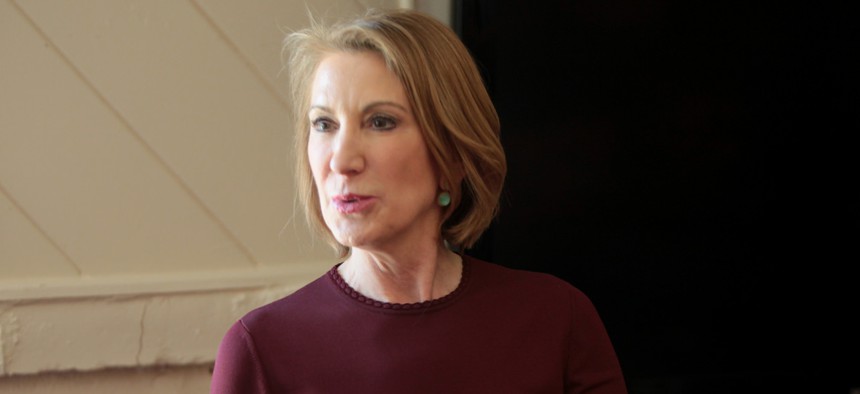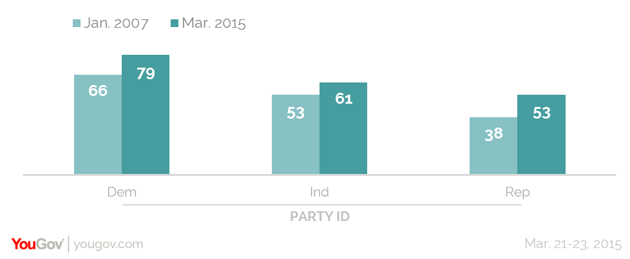
Flickr user Gage Skidmore
Why Is Fiorina Plummeting in the Polls?
After she took the Republican field by storm in September, two polls show her slipping back into the second tier of candidates.
Remember Carly Fiorina? It now seems forever ago, but in late September she was being heralded as the next big thing in the Republican primary field—the outsider candidate who could marshall establishment support, and finally slay the Trump dragon.
Now look at the polls. An NBC/ Wall Street Journal poll Monday has her at 7 percent, running behind the much-maligned Jeb Bush. That’s down from 11 in late September . A CNN poll released Tuesday is even bleaker . She comes in fourth—tied with also-ran Chris Christie and behind Rand Paul, who’s on campaign deathwatch. That’s even worse than it seems, because in mid-September she was at 15 percent in the same poll, good for second place.
So what happened to Fiorina? There’s no single obvious explanation, but here are a few ideas.
Fiorina’s polling has correlated strongly with her debate performance. She surged after dominating the undercard at the first Republican debate in August, and after winning a promotion to the main stage for the second debate, she was the consensus winner there, too. After each debate, her numbers surged. But there hasn’t been a GOP debate for more than a month, since September 16.
In that time, her stock has plummeted. Fiorina has practically disappeared from the headlines in the last few weeks. She doesn’t seem to be as good at collecting “earned media”—attention in the press, more or less. Donald Trump and Ben Carson, in contrast, are great at creating controversies that get them on TV. John Sides at The Monkey Cage has been on a crusade to convince readers that Trump’s high polling, and any dips, are caused almost entirely by the level of media attention he receives. Carson’s statements about the Holocaust and gun control, or about the Umpqua massacre , may be derided by some, but they keep his name in the news—and they rile up supporters who see criticism of his remarks as persecution. (Fiorina pulled something similar off when she insisted she’d seen a video taken at a Planned Parenthood that did not exist, but that moment passed, and she hasn’t created another.)
People have been predicting the demise of Trump’s campaign since, well, before it existed, but the drumbeat actually grew after the second debate, in which he was generally said to have put in a subpar performance. But as Molly Ball points out today, that hasn’t happened —he’s really running.
The non-demise of Trump, and the continued strength of Ben Carson, seem to go a long way to explaining Fiorina’s struggles. Her big climb coincided with Trump’s first stumble. But now his polling has stabilized. There a large group of GOP voters who want an “outsider” candidate, but however large that group may be, it’s also finite, and it’s being split between Trump, Carson, and Fiorina. In fact, Fiorina’s campaign has taken the path that many pundits expected for Trump, while Trump and Carson both gained ground in the NBC/ WSJ poll. As long as they’re strong, it will take voters away from her. Here’s the three-way matchup:
One lesson from this is that Fiorina will flounder until (a) Trump and/or Carson collapses; (b) she figures out the earned-media game; or (c) the next debate, which is October 28.
But Fiorina has always had a structural disadvantage in the campaign, because she is a woman. While Americans have become dramatically more willing to elect a female president over the last quarter-century, there remains some reluctance. It’s particularly strong on the Republican side of the aisle, as YouGov found in March :
Is the U.S. Ready for a Woman President? ‘Yes’ in 2007 vs. 2015

In a separate question, nine in 10 Democrats told pollsters that they’re rooting for a female president to be elected in their lifetimes—which lifts Hillary Clinton. In contrast, only a third of Republicans feel that way.
It’s also possible, though, that Fiorina’s support was never really there, that she was a paper tiger erected by the press. She doesn’t seem to have a natural constituency, doesn’t have much establishment support, and doesn’t have the same mix of charisma and outlandish comments that has boosted Trump. Perhaps her strong showings in late September were all just a media creation—poll numbers being pumped up by media coverage of the first debate, with her sudden polling jump begetting still more media coverage through the second debate. It will be easier to tell once post-debate polls start arriving, but even if Fiorina turns in a strong performance—and past experience suggests she will—that may not be enough to sustain real momentum.
Update, 11:43 a.m.: John Sides points me to this graph, which shows how closely the collapse in press attention to Fiorina’s campaign tracks her polling collapse:
Carly Fiorina Television Mentions, Last 30 Days

2016 Campaign Television Tracker






